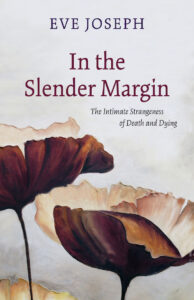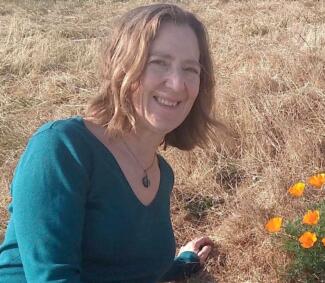‘Mysterious, difficult, and wondrous’
In the Slender Margin: The Intimate Strangeness of Death and Dying
by Eve Joseph
Vancouver: Anvil Press, 2023
$22 / 9781772142150
Reviewed by Jodi Lundgren
*

A critically acclaimed and award-winning work of nonfiction first published in 2014, southern Vancouver Island author Eve Joseph’s In the Slender Margin: The Intimate Strangeness of Death and Dying has been reissued with a new preface that calls attention to how the pandemic affected end-of-life care and disrupted bereavement practices. Drawing on her twenty years as a palliative care counsellor, Joseph interlaces memoir and exposition in a captivating, far-reaching discussion of death-related medical realities, spiritual questions, and cross-cultural practices.
The book is not thesis-driven: Joseph does not advocate a specific view of death, prescribe a grieving process, or push beliefs about an afterlife. Instead, she reflects on what she saw throughout her career and episodically revisits the death of her older brother when she was a preteen—an impactful loss that led to her “trying to sight the grief of [her] past experience through the scope of hospice work.” In many deftly drawn and enthralling anecdotes, Joseph reveals that work to be “unpredictable, mysterious, difficult and wondrous.”
Given that In the Slender Margin was widely reviewed after its initial publication, perhaps the most relevant questions to explore here are, how does this book land with readers ten years after its initial publication? What has changed?
First, the place of dying in Canadian society has evolved since the book’s original publication, making In the Slender Margin no less relevant but, rather, all the timelier. In 2016, MAID (Medical Assistance in Dying) was legalized in Canada, a move that Joseph implicitly called for in describing the limitations of hospice work: “The focus on relieving suffering and providing a good quality of life as one approaches death is of enormous benefit; and yet, in the end, I left the work thinking that although palliative care is an invaluable piece of what is needed, it is not the only answer.”
The legalization of MAID has not only provided “great peace of mind” by giving us “some say in the timing of our own death,” but it has also brought the experience of dying closer to a wider cross-section of the population. Invitations to attend the scheduled deaths of terminally ill family members and close friends are increasingly common, encouraging many to re-examine their fears of death while also sparking conversations to which Joseph’s book has much to contribute.

In her hospice work, Joseph anticipated recent developments in end-of-life care by validating the spiritual experiences of dying people, although doing so was not in her official job description as a social worker; she also observed that “people who work with the dying are doing work that was traditionally done by families.” As if in response to these points, a caring profession gaining visibility today is that of the death doula, who may offer both spiritual and material support to the dying while also facilitating the meaningful involvement of loved ones.
What else has changed since the book’s first publication? Although Joseph was then already a published poet, in 2019 she won the renowned Griffin Prize for Quarrels, a collection of prose poems. Winning this prestigious award augmented Joseph’s reputation and authority as a poet, and this matters because one of the central claims of In the Slender Margin is that “[m]etaphor, the engine of poetry, is also the language of the dying.” Joseph’s uniquely dual credentials as both a hospice counsellor and a celebrated poet deepen the credibility of many of her striking assertions, including,
The elegiac nature of poetry is derived from human grief. If poetry is how we speak to the dead, and if metaphor is the language that waits for us at the end, it is poets who help us understand death, because they are using that language now.
Alongside her critical insights into poetics, Joseph often explores the Greek and Latin roots of English words: for instance, the term “palliative” derives from the Latin palliatus, “to cover with a cloak,” a phrase that evokes tenderness and empathy, as Joseph explains: “Contemporary medical care of the dying has its roots in the impulse to take the shirts off our backs and cover the sick or injured lying by the side of the road.” By exposing the metaphors within etymology, Joseph opens up words’ possibilities, but in doing so, she also unsettles their meanings. This strategy drives home one of her overarching ideas: death always eludes our grasp.
In addition to her identity as a poet, Joseph has a unique identity as someone of British descent and Jewish ancestry who, through her first marriage to a hereditary chief of the Squamish Nation, became “legally an Indian” and eventually the mother of three Indigenous children. Her lived experience as a member of Salish communities is supplemented by her graduate work, which culminated in a master’s thesis focused on “Coast Salish perceptions of death and dying.”
In the Slender Margin contains fascinating glimpses into the cross-cultural primary and secondary research that Joseph has conducted. For instance, although she had little prior knowledge of her Jewish ancestry, she discovered that “the Native rituals that had resonated most deeply with [her] were also the rituals and beliefs of Jewish culture.” While Joseph’s comparative approach to global traditions constructively highlights connections among them, it may at times risk downplaying their deeply local specificity and significance. By current standards of cultural sensitivity, some readers may question, in particular, whether they are truly meant to be privy to sacred rituals performed inside a longhouse ceremony to which they were not personally invited. It is clear, however, that Joseph herself was, and is, embraced by Salish communities, and that in recounting events that she witnessed first-hand or participated in, she is writing about her own experiences.
Even if attitudes towards death had not shifted in the past decade, the reissued In the Slender Margin would still appeal to a new audience of readers. Speaking for myself, I wasn’t ready for this book ten years ago. Both my parents were alive and well and, despite the attention the book received when it first appeared, I shied away from its topic. In the intervening years, I have witnessed my father’s natural death, attended an aunt’s planned one, and become a caregiver for my mother, who has a terminal diagnosis. Reading the book for the first time in 2024, I am grateful to see some of my experiences reflected and set within the shared context that Joseph so beautifully articulates: “The heartbreak and grace, despair and fear, the moments of synchronicity and wonder [place] all of us—the dying and living—at the heart of the human story.”


Jodi Lundgren, Ph.D., belongs to the Open Learning Faculty at Thompson Rivers University, where she teaches literature and writing. A settler of English and Danish descent, she lives on the traditional territories of the Lək̓ʷəŋən and W̱SÁNEĆ peoples. [Editor’s note: Jodi Lundgren has reviewed Jane Munro and Peter Wohlleben and Jane Billinghurst in BCR.]
*
The British Columbia Review
Interim Editors, 2023-25: Trevor Marc Hughes (non-fiction), Brett Josef Grubisic (fiction and poetry)
Publisher: Richard Mackie
Formerly The Ormsby Review, The British Columbia Review is an online book review and journal service for BC writers and readers. The Advisory Board now consists of Jean Barman, Wade Davis, Robin Fisher, Barry Gough, Hugh Johnston, Kathy Mezei, Patricia Roy, Maria Tippett, and Graeme Wynn. Provincial Government Patron (since September 2018): Creative BC. Honorary Patron: Yosef Wosk. Scholarly Patron: SFU Graduate Liberal Studies. The British Columbia Review was founded in 2016 by Richard Mackie and Alan Twigg.
“Only connect.” – E.M. Forster